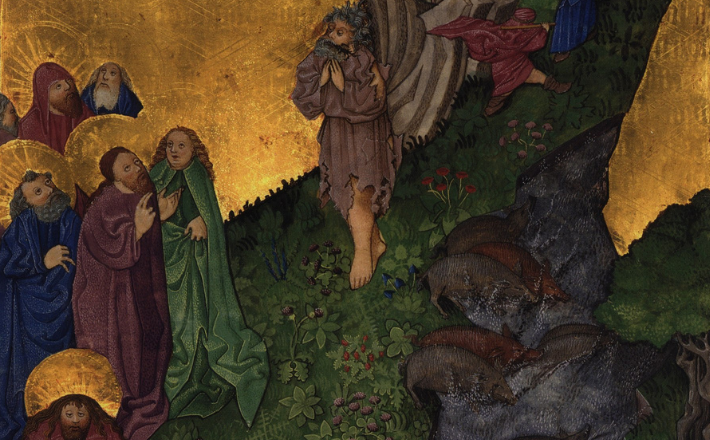Commentary on Psalm 22:19-28
This psalm was used to guide worship, rather than as a record of the particular faith journey of an individual in time.1
Its words offered the community of faith a structure in which to express their deepest suffering to God even as they remembered God’s promises and salvation, to lament and praise in harmony.
Lament is like the blues—a tenacious articulation of reality insisting, even demanding resolution. Laments, like the blues, can make intimate friends of strangers, awakening us to our shared experiences of humanity: vulnerability, love, loss, ecstasy, anguish, and everything in between. Like the blues, lament is a language of faith, an assertion of reality rooted in hope. Though we are lonely, we are not alone. Though we cry out to God from the depths of our true feelings, God hears us and is present with us.
In Psalm 22, the psalmist expresses bewilderment, surrounded by enemies depicted as animals intent on pulling the psalmist limb from limb. God is nowhere to be seen, and the psalmist is sure that death is the only possible outcome.
The psalmist holds God accountable, invoking God to intervene on their behalf. As the lament turns to praise, it seems that the psalmist is naming God’s past work of deliverance not as praise but as petition, begging God to reprise God’s acts of salvation: “My God, you have always provided, so please show up now for me!”
Verses 19–21 signal a shift from petition to affirmation. Remembering God’s help ushers in a new tone, reversing the narrative from earlier in the psalm. Whereas the psalmist was mocked by those around them, now the community celebrates with the psalmist in praise of God. Now the psalmist is surrounded by a community of love, feasting together in praise of God. Now the community is fed to satisfaction physically, emotionally, and spiritually, all within a covenant of faith.
Not only has God responded to the psalmist’s suffering, but God has answered from the depths of the suffering (verse 21b). While the afflictions are still real, God is present with the afflicted in their suffering. God does not hide nor ignore those who cry out to God, but hears them and dwells among them.
The psalmist names things that God has promised and done for Israel. The psalmist praises God in suffering, which breathes new life into the psalmist’s certain death. Commentator J. Clinton McCann phrases it like this: “To praise God is to live.”2 Nothing can separate us from God’s love for us, not even death. So, rather than describing death as that which surrounds the living, the psalmist’s praise rooted in suffering offers the opposite: Life constantly surrounds death. God’s power transcends boundaries (scientific, political, economic, racial, gender), restores what is broken, and breathes life into death.
In the practicing faith community, this praise turns into a celebratory meal, drawing all to a common table where God provides abundantly for everyone. The psalmist’s suffering has revealed a source of life for all who suffer. The psalmist becomes a witness of God’s salvation in ways that have strengthened the community and ushered in a new reality of love. You could say that the psalmist’s kenotic lamentation-turned-to-praise signals a reorientation of the world toward God.
Because Jesus evoked this psalm from the cross—“My God, my God, why have you forsaken me?”—this psalm is typically associated with the climax of Jesus’ ministry. Since the psalm was written for liturgical use, designed to help a community pray through suffering, we can see why Jesus turned to it in the midst of his suffering. For those who believe, this prayer deepens our intimacy with God, pointing not to an empirical change in the world but to an experiential change, where prayers of affliction and prayers of praise, as well as suffering and celebration, are part of a continual arc of faith, and cannot be understood without the other.
Faith is not an escape or a cure but, rather, a witness to a new world where love and life, rather than suffering and death, have ultimate power.
How are you suffering? How is your community suffering? What snares entrap your feet? To what promises do you cling when you are suffering? How does your preaching encourage your congregation to understand suffering and celebration as twin strivings of faith? How does lament deepen intimacy with God and within a congregation?
Notes
- Commentary previously published on this site for June 23, 2019.
- J. Clinton McCann, “Psalms,” New Interpreter’s Bible Commentary, vol. 4, ed. Leander E. Keck et al. (Nashville: Abingdon, 1996), 764.
References
Brueggemann, Walter, Israel’s Praise: Doxology against Idolatry and Ideology (Philadelphia: Fortress Press, 1988).
Cotter, Jim, Psalms for a Pilgrim People (Harrisburg, PA: Morehouse, 1998).
deClaissé-Walford, Nancy, Introduction to the Psalms: A Song from Ancient Israel (St. Louis: Chalice Press, 2004).
Mays, James L., Preaching and Teaching the Psalms (Louisville: Westminster John Knox Press, 2006).
Mays, James L., Psalms, Interpretation (Louisville: John Knox Press, 1994).
McCann, J. Clinton, “Psalms,” in The New Interpreter’s Bible, vol. 4, ed. Leander E. Keck et al. (Nashville: Abingdon Press, 1996).
Reid, Stephen Breck, Listening In: A Multicultural Reading of the Psalms (Nashville: Abingdon Press, 1997).


June 22, 2025